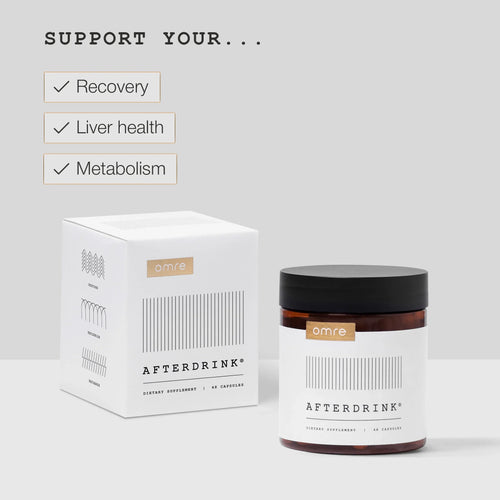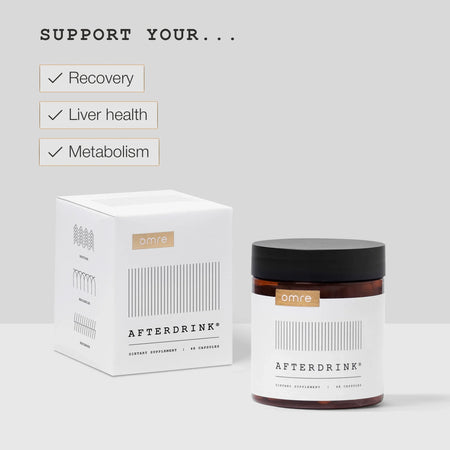Table of Contents
Is NAC good for hangovers? In this article, we're going to take a detailed look at whether NAC can be used to support hangover recovery.
If you’re reading this article, the chances are that you already know a thing or two about NAC and are looking to learn more about using it for hangovers.
NAC is short for N-Acetyl- Cysteine which is an amino acid.
It's commonly known for its detoxifying properties. So naturally, you may be wondering if NAC also helps with hangovers.
We should mention that at the time of publishing this article, NAC's definition as a dietary supplement has been removed by the FDA and is pending review. Therefore you can't purchase NAC supplements in the US.
So, with the introductions out of the way, let’s start taking a closer look at NAC for hangovers.
AFTERDRINK®
A supercharged antioxidant designed to support recovery, made from the very best, research-backed ingredients on the market.*
What is NAC?
NAC has a few different names:
- N-acetyl-cysteine
- Just "acetylcysteine"
- Acetyl-L-Cysteine
However you want to call it, it's all the same thing.
N-acetyl cysteine (NAC) is a supplement form of cysteine. Cysteine is found in most high-protein foods, such as chicken, turkey, yogurt, cheese, eggs, sunflower seeds, and legumes.
NAC is an amino acid that is best known for its role in replenishing glutathione levels. This is because NAC is the precursor to glutathione which is known as one of the most powerful antioxidants in our body.
In fact, NAC is used in hospitals around the world to prevent liver damage from acetaminophen overdose in the same way - By boosting glutathione levels.
Next up, we'll take a closer look at what the causes of a hangover are before seeing if NAC can help prevent or treat them.
NAC is the supplement form of the amino acid cysteine. It's a "semi-essential" amino acid that is important in the production of glutathione which is a powerful antioxidant.
Causes of a hangover
Before we get into whether NAC is good for hangovers or not, we'll first need to understand how alcohol causes hangovers.
Although dehydration is one of the main causes of a hangover, it's not the only one:
It's true that alcohol is a diuretic which means it makes your kidneys flush out extra water. Clearly, NAC isn't going to help with hangover related dehydration because only water can solve that problem.
Aside from this, the by-products of alcohol metabolism are another reason why we get hangovers. When alcohol is broken down in your liver, toxic substances such as acetaldehyde are formed. These are highly reactive and damage the cells they come into contact with causing inflammation.
Antioxidants, such as glutathione, neutralize some of these by-products before they cause damage.
And this is where it's thought NAC could help with hangovers.
Is NAC good for hangovers?
NAC (N-acetylcysteine) may help with certain hangover symptoms, such as nausea and weakness, but its effectiveness is not proven. A 2021 study suggested that NAC reduced hangover symptoms in women but showed no significant effect in men.
Now, let’s explore this further. NAC is often discussed as a potential hangover remedy due to its antioxidant properties, which could help combat alcohol-induced oxidative stress.
In a 2021 study published in Nature, 49 healthy volunteers were given doses of 600 to 1800mg of NAC before drinking alcohol. Researchers used a questionnaire to assess hangover severity.
The findings showed that female participants reported reduced nausea and weakness, while no significant effects were observed in males. (1)
While promising, this study was small and limited in scope, meaning much more research is needed to confirm these results.
In summary, while NAC might provide some benefits for specific hangover symptoms in women, it is not a proven hangover remedy. If you’re considering taking NAC, it’s always best to consult a healthcare professional.
Can NAC prevent a hangover?
NAC may help prevent certain hangover symptoms, such as nausea and weakness, when taken before drinking alcohol. However, its effectiveness is not fully proven, with studies showing mixed results and benefits primarily observed in women.
When to take NAC for a hangover?
NAC is best taken before drinking alcohol to potentially reduce hangover symptoms. Research suggests a dose of 600–1800mg before drinking may help alleviate nausea and weakness in women, though its overall effectiveness remains unproven.
AFTERDRINK®
A supercharged antioxidant designed to support recovery, made from the very best, research-backed ingredients on the market.*
Does NAC protect the liver from alcohol?
No, NAC does not protect the liver from alcohol. There is no substance that can fully shield the liver from the damaging effects of alcohol consumption.
NAC side effects
As with most supplements, side effects with NAC are uncommon. But they do happen. These include:
- diarrhea
- fatigue
- nausea
- a skin rash
- vomiting
Side effects are more commonly seen when NAC is given in hospital at high doses with an IV infusion.
Anything else to consider
Hangovers are a sign from your body that you've been drinking too much alcohol for your liver to handle. Taking NAC to prevent hangovers is the wrong approach.
The best way to prevent hangovers is to drink less alcohol. Second, to this, making sure you eat before going out and keeping well hydrated are also important.
Sticking to lighter-colored drinks may also help. That's because they contain fewer congeners which have been shown in studies to make hangovers more severe. You can read more about this in our article about congeners.
NAC for hangovers - Final verdict
That brings us to the end of our look into NAC for hangovers.
There are many hangover prevention supplements on the market that include NAC in their formula. However, the benefits of NAC for hangovers is anecdotal at best.
What is certain is that NAC will not protect the liver from the damaging effects of alcohol.
On top of this, NAC's status has changed from dieteary supplement to a medicine by the FDA. So you are not currently able to purchase NAC supplements.(2)





